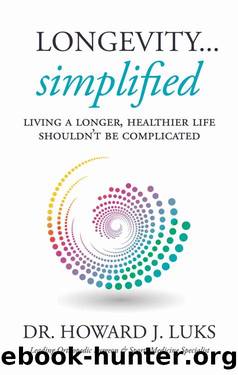Longevity...Simplified: Living A Longer, Healthier Life Shouldnât Be Complicated by Howard Luks

Author:Howard Luks [Luks, Howard]
Language: eng
Format: epub
Publisher: KWE Publishing
Published: 2022-06-20T22:00:00+00:00
Recovery from running, weight lifting, and illness require a lot of sleep. Our muscles need sleep to recover, our heart and lungs need sleep to recover, too. If protein is available, we will build new muscle protein at night. Our bodies heal themselves more often during sleep than when we are awake. When we are recovering from an illness, sleep is critical in the overall healing process.
Sleep for your immune system
Studies show that getting less than six hours of sleep can increase your risk of getting respiratory infections like the common cold. Sleep impacts several areas of the immune system like T-cells and cytokines. Lack of sleep reduces the number of immune cells available to attack pathogens like viruses. We need the army of white blood cells, lymphocytes, monocytes, T-cells, B-cells, natural killer cells, neutrophils, basophils, eosinophils, and cytokines to stay healthy.
For example, T-cells play a vital role in the proper function of your immune system. T-cells appear to be more active when you sleep, and their function is negatively affected by lack of sleep. Sleep doesnât seem to affect the number of T-cells you have, but it does affect the function of those cells. If you want your T-cells to find the invaders in your body... sleep.
Cytokines are another important group of chemicals for our immune system. They need to be in the right balance because too fewâor too manyâcan be deadly. However, when your immune system functions well, you produce cytokines to tell other cells whatâs going on. They recruit forces to protect you. When you are sleeping, you produce cytokines to help you sleep and to help you fight off foreign invaders like viruses. Poor sleep equals poor cytokine function.
In a study, sleeping less than six hours increased the risk of respiratory infections in military recruits and the general population. In another study, sleeping less than six hours increased the likelihood of developing a cold when exposed to the virus by four to five times compared to those who slept more than six hours (Prather and Leung 2016).
Sleep for mental health
Download
This site does not store any files on its server. We only index and link to content provided by other sites. Please contact the content providers to delete copyright contents if any and email us, we'll remove relevant links or contents immediately.
So Young, So Sad, So Listen: A Parents' Guide to Depression in Children and Young People by Philip Graham Nick Midgley(563)
Vital Signs by Izzy Lomax-Sawyers(465)
Wilderness and Survival Medicine by Ellis Chris Breen & Dr Craig(319)
Eating and Growth Disorders in Infants and Children by Joseph L. Woolston(308)
Case Studies in Adult Intensive Care Medicine by Daniele Bryden(305)
Boxed Set 1 Dermatology by Dr Miriam Kinai(285)
Manufacturing Social Distress by Robert W. Rieber(270)
Data Analysis in Sport by O'Donoghue Peter Holmes Lucy(249)
Vision and Perception by Howard Burton(232)
Yoga by Seber Isaiah(227)
Neuroradiology - Expect the Unexpected by Martina Špero & Hrvoje Vavro(225)
A History of Neuropsychology by J.Bogousslavsky & F. Boller & M.Iwata(222)
Complications in Vascular and Endovascular Surgery by Earnshaw Jonothan J;Wyatt Michael G;(214)
Manufacturing social distress : psychopathy in everyday life by Robert W. Rieber(211)
Basic and Advanced Laboratory Techniques in Histopathology and Cytology by Pranab Dey(209)
Qigong Massage for Your Child with Autism by Anita Cignolini(208)
The Psychology of Enhancing Human Performance by Gardner Frank L.;Moore Zella E.;(204)
A Patient's Guide to Cataract Surgery: Normal and LASIK Reshaped Cornea by Unknown(198)
The Liferaft Survival Guide by Howorth Michael;Howorth Frances;(197)
